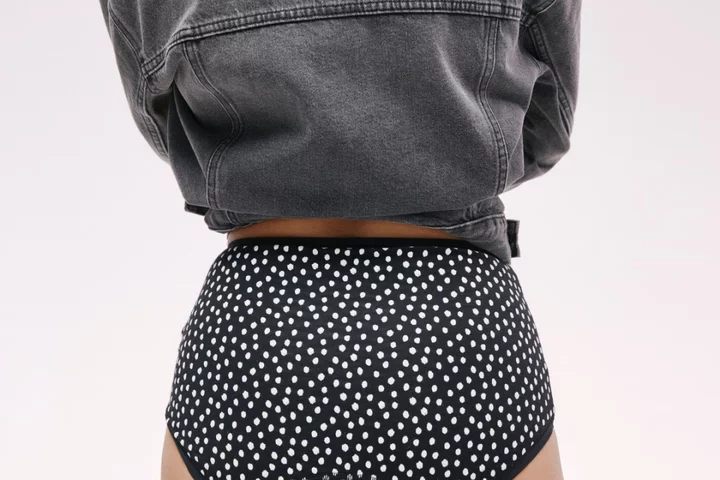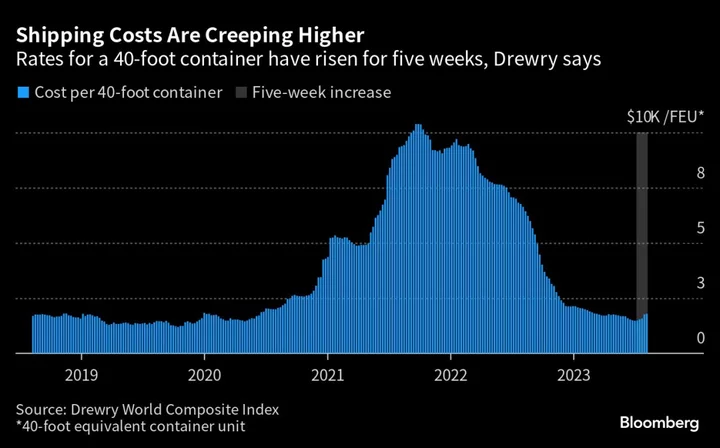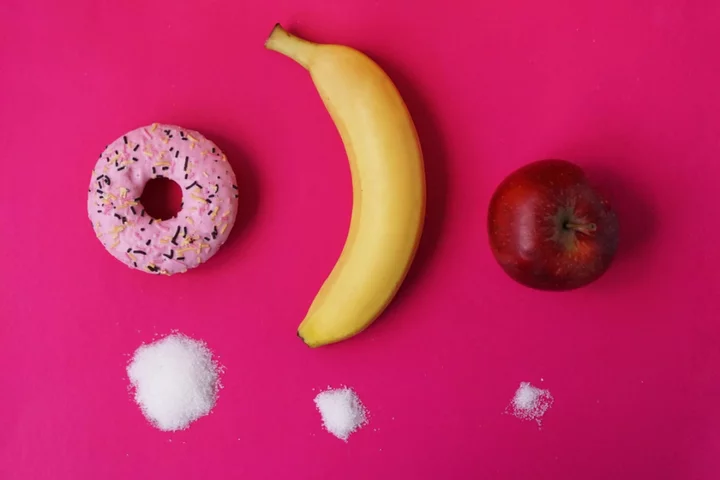
Factbox-Major deals in global luxury market in the past decade
Coach parent Tapestry said on Thursday it will buy Michael Kors owner Capri Holdings in a deal valued
2023-08-10 21:57

Government urged to remove VAT from period pants
More than 50 MPs, retailers and charities have written to the government urging it to remove the 20% VAT on period pants, the reusable underwear designed to be worn as an alternative to using tampons and sanitary towels. Other period products such as pads, tampons and menstrual cups are exempt from VAT, but consumers currently pay a 20% tax on period pants as they are classified as garments. The letter, signed by 35 MPs and peers, the chief executives of Marks & Spencer and Ocado, the publisher of Hello! magazine and several charities and non-profit organisations, including Breast Cancer Now, the Marine Conservation Society and Forum for the Future, calls on Financial Secretary to the Treasury Victoria Atkins to reclassify the pants as period products in the Chancellor’s autumn statement later this year. The government made a brilliant start by removing VAT from disposable period products but we need them to finish the job and level the playing field so that whatever period product someone chooses to use, it is VAT free Victoria McKenzie-Gould, M&S M&S has also launched the new Say Pants to the Tax campaign with the period underwear brand Wuka, promising to pass on 100% of any cost savings to shoppers if it is successful. A five-pack bundle of period pants at M&S costs £35, but would be £28 without VAT, while a pack of three – currently £20 – would drop to £16. M&S, which said it sells more than 6,000 packs of the pants each week, and Wuka calculated that their customers combined had paid more than £3 million in VAT on period pants. A survey of 268 women aged 18 to 54, conducted last month, found that 23% of respondents cited cost as a reason for not using period pants, with 83% in favour of dropping VAT from the products. Period pants can be washed and worn again for months, which means they can save consumers money and help reduce plastic waste. Wuka estimates that one pair of period pants can save 200 single-use plastic disposables from going to landfill. Victoria McKenzie-Gould, corporate affairs director at M&S, said: “The government made a brilliant start by removing VAT from disposable period products but we need them to finish the job and level the playing field so that whatever period product someone chooses to use, it is VAT free. “Nearly 25% of women cite cost as a barrier to using period pants. If they were classified as they should be – as a period product – the government can make this brilliant alternative to disposable products a more cost-effective option for UK consumers.” In May, the Treasury said it would analyse whether the removal of the “tampon tax” has helped lower prices. Responding to a written question from the Labour MP Ruth Cadbury, the government said a tax reduction was able to “contribute to the conditions for price reductions” and it was “looking into whether this important zero rating is being passed on by retailers to women as intended”. Read More Charity boss speaks out over ‘traumatic’ encounter with royal aide Ukraine war’s heaviest fight rages in east - follow live How to lower your blood sugar levels, as new research reveals heart disease link Remove VAT from period pants, government urged ‘Long Covid has taken away my ability to eat food or urinate in three years’
2023-08-10 21:25

Virgin Galactic Is Set to Fly First Private Tourists to Space
Virgin Galactic Holdings Inc. is poised to launch its first private space tourists on Thursday morning, the company’s
2023-08-10 21:20

Shipping CEO Sees ‘Green Shoots,’ Says Container Rates Must Rise
Supply Lines is a daily newsletter that tracks global trade. Sign up here. The container shipping industry’s year-long
2023-08-10 20:59

How to lower your blood sugar levels, as new research reveals heart disease link
Raised blood sugar levels could be linked to a greater risk of heart diseases, a new study suggests. Research from the London School of Hygiene and Tropical Medicine found that men and women with raised blood sugar levels have a 30-50% increased chance of developing cardiovascular diseases (CVDs) even when these levels are below the threshold for diabetes. Highlighting the importance of diet and lifestyle factors, the study also found that for blood sugar levels within the normal range, those with the lowest levels had a 10% lower risk of developing any form of CVD, which includes heart attacks and strokes. What are blood sugar levels? “Blood sugar levels, also known as blood glucose levels, are a measurement that shows how much glucose you have in your blood,” says Dr Gill Jenkins, GP, and advisor to the Tea Advisory Panel. “Glucose is a sugar that you get either directly from food and drink, through digestion of carbohydrate-containing foods, or through other metabolic processes in the body.” Blood sugar levels fluctuate throughout the day, she explains: “Increasing with eating and drinking (including alcohol), falling if you haven’t eaten or drunk for some time.” The energy spike and subsequent slump you get from a fizzy drink or sweet snack is explained by the rise and fall of blood sugar. “Blood glucose levels can also change with exercise, state of hydration, and with physical or mental stress, and certain medications,” Jenkins says. “Even in people without diabetes, major illnesses, hormonal disorders, or certain medications such as steroids and some antidepressants, can cause blood sugar fluctuations.” How can you tell if your blood sugar is raised? Getting a sudden energy boost from a sugary food or drink isn’t actually a symptom of high blood sugar, also known as hyperglycaemia. “Symptoms of very high blood sugar usually come on gradually and include feeling very thirsty, peeing a lot, blurred vision, feeling weak or tired and unintentionally losing weight,” Jenkins says. “However, you may have no symptoms – or may not notice them – running constantly raised sugar levels.” How to lower your blood sugar levels Diet, exercise and other lifestyle factors can all impact your blood sugar levels. “In general, avoid eating too much sugary or starchy food – and that includes sugary drinks, as well as alcohol,” says Jenkins. “Focus as much as possible on unprocessed grains, such as oats, mixing in a few seeds or nuts.” Getting your five-a-day fruit and vegetables also helps: “Especially green leafy varieties such as kale, broccoli, spinach, cavolo nero.” Fruits such as strawberries, raspberries and blueberries are excellent, but be careful with ripe tropical varieties: “Limit fruit which may, depending on the individual, produce a higher glycaemic response, such as mango, banana, pineapple, melon.” Stay hydrated with water or other low-sugar beverages, such as tea, which has been shown to normalise blood sugar levels following a meal. “The reason for these findings are related to the polyphenol content of black tea, which help to regulate blood glucose and insulin,” says Jenkins. Aim for the NHS-recommended 150-minutes of exercise a week, combining moderate movement – such as walking – with intense activity, if your fitness allows. “Walking alone reduces weight – if you also pay attention to diet – and improves insulin sensitivity, which helps to control blood glucose,” Jenkins says. “Even if you don’t ‘exercise’, being more active will help – take the stairs rather than the escalator, park your car a little further from work, get off the bus one stop early and then walk.” A study last year found that even standing up as much as possible throughout the day can significantly reduce your blood sugar levels. Lastly, check with your GP if you have other illnesses, advises Jenkins. “If you have diabetes, take your diabetes medication exactly as prescribed and follow any recommendations your diabetes nurse, doctor or health care team gives you.” Read More Charity boss speaks out over ‘traumatic’ encounter with royal aide Ukraine war’s heaviest fight rages in east - follow live Remove VAT from period pants, government urged ‘Long Covid has taken away my ability to eat food or urinate in three years’ 11 ways to max up your monochrome scheme
2023-08-10 20:53

Pedaling beats polarization in a huge, cross-Iowa bike ride
American politics are tense and polarized, and the Iowa causes are just six months away
2023-08-10 20:49

Dancer who has Tourette’s tics says Lewis Capaldi’s Glastonbury performance left her ‘speechless’
A dance teacher diagnosed with Tourette’s syndrome – meaning she has unpredictable tics where she whistles, blinks and sometimes swears – has said watching Lewis Capaldi’s “beautiful” Glastonbury performance left her “speechless” and she wants to raise awareness of the incurable condition so others do not feel “lost or alone”. Bryony Munro, 24, a dance teacher who lives in Scotland, started experiencing symptoms of Tourette’s syndrome – a condition which causes a person to make involuntary sounds and movements called tics – when she was 12 as she started to spontaneously hiccup. However, it was not until her early 20s, in summer 2021 – when her limbs started “jerking all the time” and she developed other tics, such as whistling, clearing her throat and blinking – that she received an official diagnosis, which she described as “bittersweet”. “I was very happy to have that definition, but then knowing what comes with that was very daunting and scary; I was terrified,” Bryony told PA Real Life. In the years leading up to her diagnosis, Bryony said people would stare at her in public, whisper, and talk behind her back, saying “She’s making it up” or “She’s faking it” – and this made her realise that “people are very misinformed of what Tourette’s is”. “People treated me differently because they didn’t believe I was telling the truth and they tried to tear me down,” she said. “I wish they would have just asked me questions rather than making up rumours behind my back that aren’t true.” Bryony has since set up her own Instagram and TikTok accounts to address the most common misconceptions about Tourette’s, as she wants to raise awareness of the condition, but the “outlets” that have helped her through her darkest times are music, singing and dancing. She said performing in front of an audience can be “terrifying” when you have Tourette’s, but she believes Capaldi’s moving performance at Glastonbury, where he appeared to struggle with an increasing number of tics while singing his hit song Someone You Loved, will help to change the way the condition is perceived. “It was almost like an out-of-body experience because I just put myself in his shoes,” she said. “My heart broke – not in a bad way – but seeing the amount of love he received from his fans left me speechless, it was just beautiful, and having so many people watch that live or online just brings so much awareness and takes the pressure off the Tourette’s community because they are beginning to see what it’s really like for people with the condition.” Tourette’s syndrome is a condition that causes a person to make involuntary sounds and movements called tics, and there is no cure, the NHS says. Tics are not usually harmful to overall health, but physical manifestations, such as jerking of the head, can be painful, and may be worse during periods of stress or anxiety. Bryony’s first tic came in the form of a hiccup or “inhale of breath”, which did not affect her daily life at the time, but her symptoms progressively worsened. Her tics became debilitating during the Covid pandemic, which led to her diagnosis in 2021, but her lack of knowledge about the condition initially left her feeling “terrified”. Her other diagnoses of obsessive-compulsive disorder (OCD), anxiety, depression and functional neurological disorder (FND) – which affects how the brain receives and sends information to the rest of the body and can cause Bryony to have absence seizures – added to her concerns as she feared she would have a “constant battle with her mind and body”. “I think seeing how it was presented on TV and in the media, and initially having my own misconceptions about Tourette’s, made me feel terrified to have to live with it,” she said. “Tics can be very damaging as there are very aggressive tics that can make you kick, punch, jump and literally jump out into oncoming traffic, which is terrifying. “When my tics first started getting worse, I had this punching tick where I punched a wall, but some of my other tics, like my toes wrinkling, are not visible to others. “I was very much in the dark to begin with, but doing research and reaching out to people was probably the best thing I could have done.” While Bryony’s tics have not put her in any life-threatening situations, she said daily tasks, such as brushing her teeth or doing her make-up, can be challenging and time-consuming. She cannot drive and, on days when her tics are particularly bad, she cannot cook, style her hair with straighteners or curlers, or use the kettle, as she could hurt herself. “It’s so unpredictable and, right now, I’m not able to go anywhere on my own just in case I do have an episode where I might hurt myself,” she explained. Bryony has “tools” to manage her Tourette’s, such as using stress toys to “keep (her) hands busy”, but she said she does not know where she would be without music, singing and dancing. She teaches dance to pupils ranging from two-and-a-half years old to 30, and said focusing on something else “helps (her) tics melt away for a little while”. She is training her golden retriever puppy Nala, whose name was inspired by Disney’s The Lion King, to become an assistance dog so she can “live a more normal life” in the future. “Having that independence back again from taking Nala into work, to do shopping, maybe to go to the gym, it will be so relieving; the pressure will be enormously decreased,” she said. “Even the social anxiety of being out of the house, having her with me will just be so good for me.” Bryony, who lives with her “incredibly supportive” fiance Matthew, 31, a chef, wants to continue raising awareness of Tourette’s, and is even more inspired to educate others after Capaldi’s performance at Glastonbury in June, as she has seen the “love” he has received and does not want anyone to feel “lost or alone”. “Knowing he had the support of every single person there; I couldn’t imagine the amount of love that he must have felt,” she said. “I felt it through watching it through my phone, I fully felt all of that.” She added: “You never know anyone’s full story or full life story, so accepting people for who they are, and accepting yourself for who you are, is probably the best advice I can give. “Also, just be kind because you have no idea what anyone is going through.” You can follow Bryony on Instagram or TikTok @brydoeslife Read More ‘Long Covid has taken away my ability to eat food or urinate in three years’ Grimes says her and Elon Musk’s three-year-old child X ‘knows a lot about rockets’ How many steps a day can cut risk of early death (and it’s not 10,000) ‘Long Covid has taken away my ability to eat food or urinate in three years’ Grimes says her and Elon Musk’s three-year-old child X ‘knows a lot about rockets’ How many steps a day can cut risk of early death (and it’s not 10,000)
2023-08-10 20:28

Olive Oil Shock Keeps Cost of Making Pizza Margherita High
The cost of making a classic Pizza Margherita at home rose at more than twice the pace of
2023-08-10 20:27

Coach Owner to Buy Michael Kors Parent in $8.5 Billion Deal
Tapestry Inc., the owner of brands including Coach and Kate Spade, agreed to acquire Michael Kors parent Capri
2023-08-10 19:59

'Wife beater' vests have got a rebrand, and its about damn time
The simple white vest is an iconic style, and a favourite of men from Tony Soprano to Stanley Kowalski, Marlo Brando's character in A Street Named Desire – but its nickname has become somewhat dated. Now, Gen Z social media users have come up with a new term for the jarringly named “wife beater”, after a resurgence in popularity of the white tank top. People have started referring to the item as a “wife pleaser” to make it less triggering for victims of family and domestic violence. Tutorials on how to style the top have surged in popularity in recent times, while fashion magazines and websites have started listing them in articles like the “best wife pleasers of the summer”. Sign up to our free Indy100 weekly newsletter The term has been prompting anger for several years already. In 2018, The New York Times ran an opinion piece titled: "Are we really still calling this shirt a wife beater?" “I myself have used the term before — and I’ve worn the shirt plenty — but this time it stopped me cold. Given the torrent of revelations of abuse against women in the #MeToo era, the name suddenly seemed grossly inappropriate,” wrote the author. He continued: "We don’t call our pants 'child molesters' or our hats 'cat mutilators'. We immediately recognise such descriptions as violent and abhorrent. And yet, we somehow overlook the same when we call our shirts wife beaters." The “wife pleaser”, by contrast, appears to have been in use since last year, and has now gone viral again. In July 2022, InStyle ran an article about American actor Chris Evans’ love of the item, called ‘Chris Evans’s "wife pleasers" are this summer's ultimate fashion throwback". Social media users on TikTok are also calling it the “wife respecter” and a “wife caresser”. And in 2018, Jonathan Van Ness, star of Netflix series Queer Eye, even called it a “wife lover”, when the cast were helping a subject choose an outfit on the show. The term wife beater, meanwhile, has far more sinister roots. It appears to have entered common use in 1947, when a man wearing a white tank top was arrested for murdering his wife. His mugshot was nicknamed “The Wife Beater”, and the term stuck. Have your say in our news democracy. Click the upvote icon at the top of the page to help raise this article through the indy100 rankings.
2023-08-10 19:26

‘Long Covid has taken away my ability to eat food or urinate - I don’t recognise myself anymore’
A young woman whose health “deteriorated rapidly” after being diagnosed with long Covid and suffering a liver bleed is now in a wheelchair, feeds herself through a tube in her chest and has been unable to urinate in three years. Abigail Snowball, 29, was told she suffered from a rare condition known as Fowler’s Syndrome a few months after she was diagnosed with long Covid in July 2020 and her bladder stopped working. The social worker, from Northumberland, says she was “never sick” and enjoyed long runs before testing positive for coronavirus in early 2020 and feeling a sharp pain under her ribs which scans showed was a bleed on her liver. Abigail had not fully recovered from the virus and since the diagnosis, her health has gone from bad to worse, to the point where she has not been able to urinate in three years. She now depends on her husband Mark, 34, to carry her to the bathroom so she can empty her bladder, which can take up to four hours, and has not been able to enjoy a mouthful of food for nearly a year. “I had never really been ill before,” Abigail told PA Real Life. “As a child, I was always really lucky and never poorly. I look back at pictures from before Covid and I don’t even recognise myself.” Abigail had completed a 20-mile race, the Run Northumberland BIG 20, just a week before testing positive for Covid and having to quarantine away from Mark, who works in maintenance for Nissan. “It was very much at the start of the pandemic, back at the time when there weren’t any vaccines or much testing,” she said. “It was just tiredness like I’ve never felt before in my entire life. I remember having a cup of tea and struggling to lift the mug up.” Like many other people’s experience of catching Covid, Abigail’s health improved over the next 10 days. “I did get better, but I never fully recovered,” she said. But a couple of months later, while visiting her parents, Jane and Ray Cresswell, in Cornwall on holiday, she suddenly began feeling a sharp pain under her ribs. “It was a really strange location to have pain,” she added. She visited the GP a week later and was admitted to Northumbria Specialist Emergency Care Hospital (NSECH) in July 2020, where scans revealed Abigail had suffered a bleed on her liver. “That’s when they diagnosed me with long Covid,” she said. “There was no other explanation, because they tested for blood disorders and carried out a scan. “They asked me if I had a fall or accident, but there was literally nothing.” Abigail was recovering from her liver bleed in hospital late one evening when a nurse asked when the last time she urinated was. “I actually thought, ‘god, it wasn’t since this morning’,” she said. “From that point, my bladder never regained any function. That was really the start of my health declining quickly.” Doctors hoped her bladder block was simply a result of the liver “trauma” and that she would be on the mend soon. But, sadly, this was not the case. A few months later, Abigail was diagnosed with a rare condition called Fowler’s Syndrome, which causes women to have problems passing urine. Abigail’s condition has deteriorated over the past few weeks and she is now losing weight rapidly. “I am now sleeping on the sofa downstairs and my husband Mark is having to carry me to the toilet and back again,” she said. “We can spend up to four hours at a time trying to drain my bladder, and the pain is just unbearable. “I went from running 20 miles to using a wheelchair. You don’t realise how inaccessible the world is until you are in that position.” Since the diagnosis, Abigail has spent more than 350 days in hospital and undergone 12 surgeries, including one in October 2021 to try and reconstruct her bladder. To make matters worse, she developed intestinal failure last year, which means she can no longer eat food. “I haven’t eaten anything in a year now,” she said. Instead, she is fed through TPN (total parenteral nutrition), a tube in her chest which delivers nutrients directly into the blood stream. Abigail and Mark, who married earlier this year in May, both received close to six months of training on how to perform the feeding procedure given there is a high risk of infection. “We had never even heard of that – being fed through a line into your heart,” she said. Abigail has been told by doctors that her liver bleed was “extremely likely” to have been caused by Covid. While Covid is known to harm the lungs, it has also been found to affect other organs, including the heart, liver and kidneys, but wider research is needed to better understand its long-term effects. Liver problems are common among patients with Covid-19, according to a study carried out by researchers at Oxford University and published in the peer-reviewed journal Hepatology Communications. Abigail, whose condition is considered “severe”, is hoping to receive specialist treatment in London, known as bladder Botox, which involves injecting Botox into the bladder every three to nine months, but there is no guarantee this will work. “Because of how severe and complex my case is, we’ve exhausted all our options here and the doctors are saying that I need to see the specialists in London,” she said. “Removing my bladder completely remains on the cards, but it’s incredibly high risk because of my intestinal problems. “There is no cure for Fowler’s, so it’s about managing it in the best way possible.” The combination of health conditions has left Abigail unable to perform everyday tasks. “It’s funny because the things I want to be able to do are so normal,” she said. “Just being able to wake up, take the dog for a walk and go to work. “Things that in the past, I completely took for granted.” To help cover the costs, Abigail’s friend Emma Holt has set up a GoFundMe which has received thousands of pounds in donations. “We never imagined in our wildest dreams that we would raise the amount of money that we have already,” she said. “It’s the one thing that really keeps us going, when things are really difficult. “Knowing that we have so many people behind us and supporting us is amazing.” Fowler’s Syndrome is most often caused by infection or following surgery or trauma, but a link to long Covid has yet to be established and more research is needed. Dani Coombe, CEO, Fowler’s Syndrome UK said: “It’s too early to say if long Covid is a trigger for Fowler’s syndrome; we haven’t seen an increase in Fowler’s and retention post-Covid yet, and there is no indicator that urinary retention gets worse. “Our research into what patients believe triggered their urinary retention shows that infection is the most common trigger at 57 per cent, followed by surgery in 32 per cent of patients and trauma at 19 per cent. “It would be noteworthy to see in coming years if there is an increase in women with Fowler’s because of the trauma of Covid-19.” Read More Fake meat is dying, but that shouldn’t mean the end of veganism What I gained (and lost) from walking 10,000 steps a day for five months Woman behind ‘not real’ plane tirade identified as marketing executive with $2m home Charity boss speaks out over ‘traumatic’ encounter with royal aide Ukraine war’s heaviest fight rages in east - follow live
2023-08-10 18:52

Studios Are Raking in Profits While Actors and Writers Are on Strike
Large media companies have been reporting stronger-than-expected profits as the twin strikes by Hollywood writers and actors grind
2023-08-10 18:47
